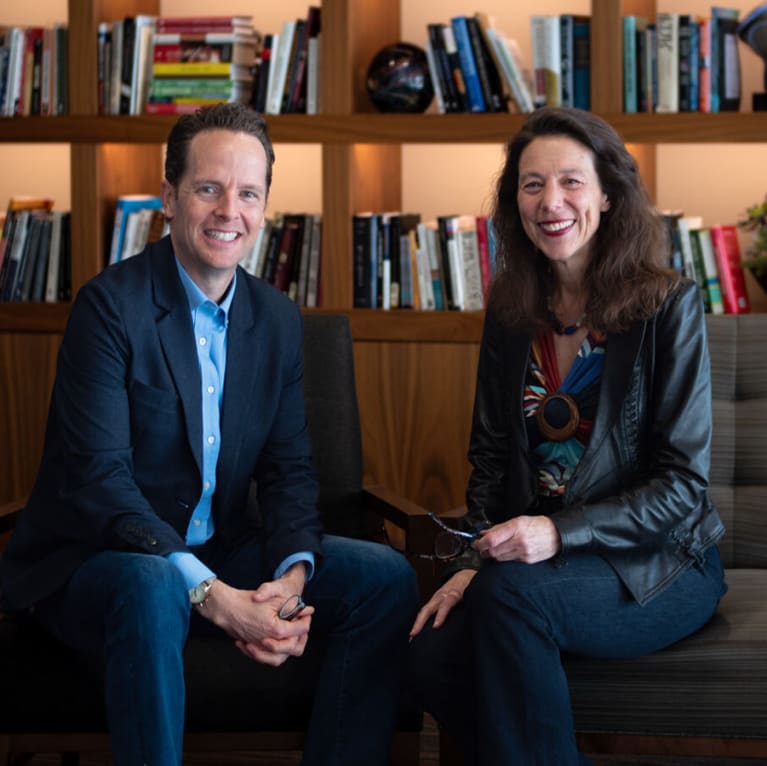
“Leadership is an activity, not a position of authority,” Ed O’Malley and Julia Fabris McBride of the Kansas Leadership Center (KLC) write in their new book, When Everyone Leads the Toughest Challenges Get Seen and Solved (Bard Press, 2023). “If you don’t have the title, you can still use your influence.”
O’Malley founded the Wichita-based KLC in 2007 and served as president and CEO of the nonprofit for 15 years. He is a former Kansas state legislator and gubernatorial aide and co-author of Your Leadership Edge: Strategies and Tools for When Everyone Leads (Bard Press, 2022). He currently serves as president and CEO of the Wichita-based Kansas Health Foundation (KHF), which founded the KLC to foster civic leadership by teaching soft skills such as engagement, collaboration and powerful questioning.
Fabris McBride is the center’s chief leadership development officer and interim president and CEO, as well as the co-author of Teaching Leadership (Kansas Leadership Center, 2015). She was an actor in Chicago, is a certified coach, and taught leadership and management at the University of Chicago, Columbia College Chicago, the University of Massachusetts, and the James P. Shannon Leadership Institute in St. Paul, Minn.
The premise of When Everyone Leads is that leadership and authority are two different attributes, and organizations benefit when everyone is empowered to “ask powerful questions, look for multiple interpretations of a situation and act experimentally to find creative ways to move forward,” the authors write. Developing leadership muscles comes with realizing that although you might not have influence over everyone to solve a problem, “you do have influence over some people and you can at least start to exercise leadership with them,” O’Malley said in a news release.
According to research on leadership development that KLC released in 2021, “most leadership development programs focus on a select few, typically those at the top of an organization or being groomed for executive management. In today’s turbulent times, traditional leadership development approaches do not suffice. Forward-thinking organizations need people at all levels empowered to lead and catalyze change.”
SHRM Online spoke with O’Malley and Fabris McBride about what behaviors hiring managers should look for to spot potential leaders, how recent graduates and emerging professionals can position themselves as leaders, and how to cultivate “skillful intervention,” which they define as thinking about a challenge, its multiple interpretations, and who needs to be engaged to act on that challenge. 
Responses have been edited for clarity and brevity.
SHRM Online: You write that people who are not in positions of authority can still be influential. Please elaborate.
Fabris McBride: Nobody exerts leadership all the time, no matter what their role, and everybody has the capacity to exert leadership some of the time. We place a lot of expectations on people in authority roles to exercise leadership, and that lets the rest of us off the hook. We need everybody equipped and ready to lead.
O’Malley: You don’t have to wait to be authorized to lead; you can just do it. We think leadership comes in little moments that are coming at people all day long. Most of us are oblivious to the moments and they come and go. Those are moments to exercise leadership. You don’t have to have a top job to seize one of those moments. The moments might be different for the front-line employee than the CEO.
SHRM Online: How can hiring managers spot the potential for leadership in a job candidate? What qualities or traits should they look for?
Fabris McBride: It’s not as much about qualities or traits as it is behaviors. Do [the job candidates] ask open-ended questions? Does the person coming into the interview have thoughts about the company’s mission or business? Do they have a curious question that maybe even makes the hiring manager stop and think? How well do they listen? Are they able to be present and listen and take in different perspectives as to what the role might be? As they talk about who they are and what they want to bring to the role, do they demonstrate that they’re looking at the challenges of the job—including putting themselves in the position of the customer or end user?
O’Malley: A hiring manager could compose questions asking how the applicant would solve a big challenge. The people who have the knack for exerting leadership are going to talk about the process by which they’d solve the issue. For example, if asked how the company can get more market share and the answer is to revive the brand and refocus on who we market to, that’s not leadership thinking. But if they answer along the lines of “First thing we need to do is gather the pertinent people and ask everybody what they think is getting in the way of the product, collectively discern the key theme of what’s holding us back, and then run experiments,” that’s a leadership approach.
SHRM Online: How can the recent graduate or emerging professional new to the workforce position themselves as potential leaders—speaking up in meetings, for example?
O’Malley: Speaking up in meetings is not necessarily a leadership quality. For young professionals, it’s about the questions you ask. It’s the ideas you offer. A lot of young professionals are so focused on what’s expected of [them] and how [they can] do it really, really well. That’s a way to success, but that’s not a way to leadership.
The people who exert leadership as young professionals are asking tough questions. Young professionals can get away with asking tough questions. They figure out what’s expected of them, and they’re also asking lots of big questions and ideally questions that don’t have clear answers, such as “What did we learn from the last several all-hands meetings and how is that affecting how we’re doing business today?”
SHRM Online: You write about “intervening skillfully.” What does that look like, and how does that display leadership?
Fabris McBride: It means doing something—whether it’s a question or making a provocative statement or [looking for multiple] interpretations [of a situation] to get people … looking at the challenge that matters. I won’t know if I intervened skillfully unless someone gives me feedback. Do you have allies and confidants who are willing to give you frank feedback about your interventions and coach you a little bit?
O’Malley: The world is full of passionate advocates. We’re trying to help people understand the difference between a passionate advocate and a passionate advocate who makes progress. Just intervening is not enough. We should not pat ourselves on the back because we stood up and gave a powerful, provocative speech. Did it move the issue forward, or did it alienate people from your cause? Leadership is about results. Just being someone who’s in favor of inclusion doesn’t mean you’ve intervened skillfully for inclusion.
SHRM Online: Some organizations have programs to develop employees they consider “high potential” for leadership positions. What one or two components should such programs include?
O’Malley: Most leadership programs are really management programs, and most of those programs are about finding people for roles that have big titles. If that is your type of program, please help those would-be managers understand the distinction between leadership and authority. You’re going to be in an authority role someday because you’re in a special program; it doesn’t mean you’re exercising leadership.
If you can create a leadership program that is for everybody, it will be a game-changing process. Our research [Organizational Impact and Leadership Development Capacity, 2021] found when everyone leads, you can solve the toughest challenges. It’s about unleashing the leadership from people throughout the organization. If you can create a leadership development experience, whether or not they’re not on the management track, it’ll have powerful results.

